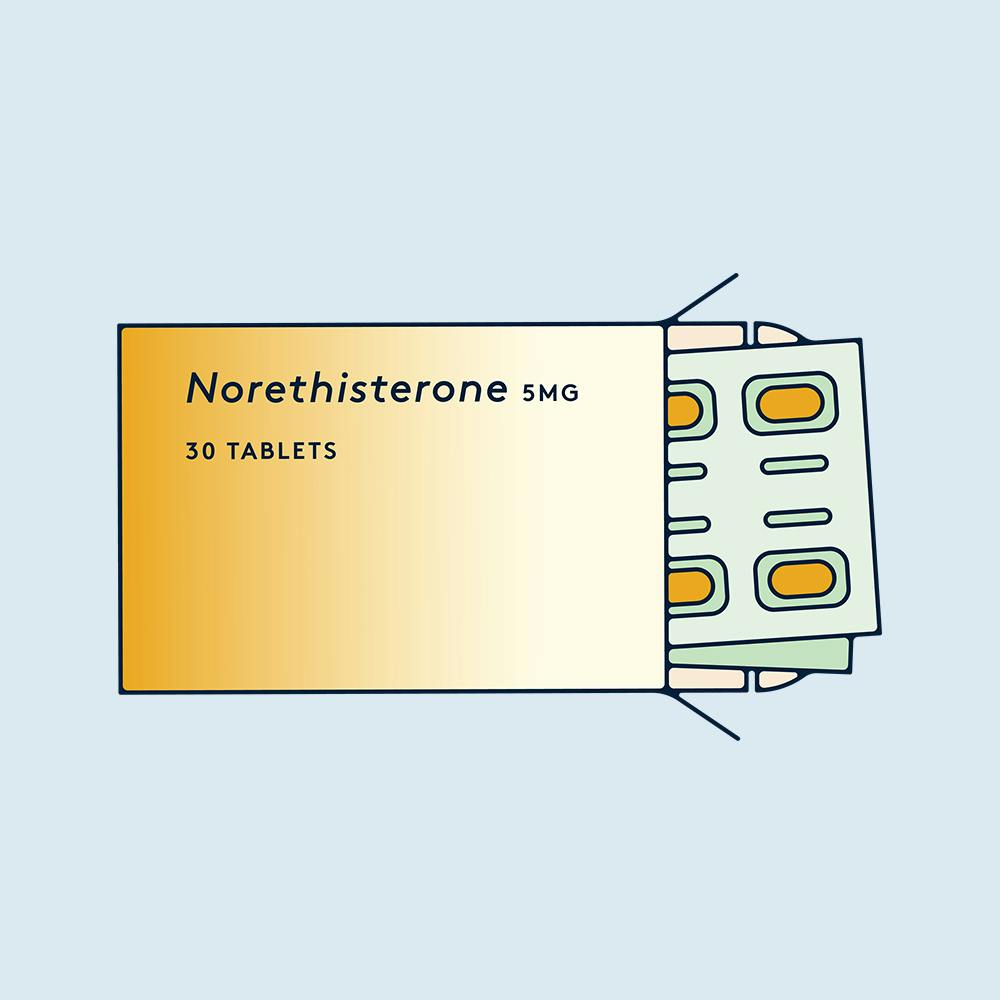Table of contents
Illustrated by Erin Rommel
Everyone experiences their period differently. For some it’s a small inconvenience, but for others it can be a debilitating experience.
Periods are like a subscription service you never signed up for, but there are ways to skip or opt out if you want. If you have a difficult relationship with your period, or if you’d just rather go without the bleeding and cramping every month, we’re not here to judge. Several methods help you manage, delay or stop your period altogether.
Science still can’t make sense of why we have periods, but we know that aside from the reassurance that you’re not pregnant, there’s no actual health benefit to bleeding every month.
How to delay your period
Unfortunately, once your period has started there’s no way to stop it, so the only option is to ride the crimson wave until it’s played out. However, you can delay your period before it starts.
The period delay tablet
The period delay tablet contains norethisterone, a synthetic hormone that mimics progesterone. It’s similar to the synthetic progesterone found in the combined oral contraceptive pill (COCP) and the progesterone-only pill (POP), aka the mini pill.
Although norethisterone is similar to the mini-pill, it is not a form of contraception so you can still get pregnant while taking the period-delay tablet.
Norethisterone acts by keeping your hormone levels steady, preventing the drop in progesterone that triggers the endometrium to shed (your period). Norethisterone needs to be taken 3 days before your period is due, and you’ll need to take 3 pills a day for up to 20 days. Once you stop taking the pills, your period should come back within 3 days.
Are period delay tablets safe?
Although it’s considered safe and risk-free, some women report nausea, breast tenderness, mood swings and headaches while on the period delay pill. Spotting is also common, and it’s also not recommended for people with a history of blood clots.

How to stop your period
Most forms of hormonal contraception are also a good option for delaying or stopping your period altogether. This is known as menstrual suppression.
The contraceptive pills, IUS, injection, vaginal ring, implant and patch all have the potential to stop your period from coming every month.
If you find yourself needing or wanting to delay your period regularly, hormonal contraception is likely a better option compared to the period delay tablet.
Does birth control stop your period?
People who are already on hormonal contraception do not need to take norethisterone.
The combined oral contraception pill (COCP) and progestogen-only pill (POP) can be taken back-to-back without the 7 day break in order to prevent the monthly withdrawal bleed (which is often mistaken for a “real” period).
If you’re on the COCP or POP and would simply like to delay your period, you can do so by taking it longer than 21 days for as long as you need to delay your period, and then have the 7 day break when you’re happy to bleed again.
Similarly, the patch and vaginal ring can help you time your period to fit your schedule. They are both worn for 3 weeks, followed by a 7 day break in which you will have a withdrawal bleed. If you have a big event or holiday coming up and would rather not deal with cramps, leaks and bleeding, you can simply plan ahead and make sure your 7 day break doesn’t coincide with your holiday or event. The patch and ring can also be worn back-to-back without the need for the 7 day break.
If you’d rather stop your period altogether but don't want to take a pill daily or regularly change your patch or ring, hormonal long acting reversible contraception (LARC) methods are your best bet. For most people, the contraceptive injection, implant and IUS will all reduce or stop monthly bleeds.
Although hormonal contraception is an effective way to delay or suppress periods, the variety and your own anatomy will impact how well it will work. Breakthrough bleeding is always a risk with hormonal contraception, so even if you’re not having a regular monthly period, you might get occasional spotting.
Speak to your GP or healthcare provider about your medical history and current health before taking or switching contraceptive methods. A period-free life is not worth the potential side-effects of the wrong form of contraception!
Does ibuprofen stop your period?
You may have heard that another period delay method is taking very high doses of ibuprofen. While this is technically true, it’s not something doctors would advise doing.
“The shedding of your uterus lining is an inflammatory process so taking an anti-inflammatory (e.g. ibuprofen) partially blocks this process and has been shown to reduce volume of blood loss,” says Dr. Harry Baxter, Daye’s Head of Research. “Although this can be effective as a one-off, it is by no means a long-term solution, as anti-inflammatories increase your risk of gastric ulcers and kidney injury.”
Do tampons make your period longer or shorter?
Another myth is that what period care solution you use will impact the length of your period, but there is no evidence to back up this claim. Some think that tampons block the blood flow, making your period last longer, some think that since they absorb the flow it makes your period shorter.
The theory that sanitary products can impact the length of your period has no basis, and is likely because different period care solutions work for different people.
Whether it’s a tampon, cup, pad or period-proof underwear, the best option is the one that makes your period easier to manage.
Choosing the method that makes you feel most comfortable – and less stressed out – will inevitably make it feel like your period is over quicker. The easier your period is to manage = the less it’s on your mind. Maybe all those patronising tampon adverts we saw growing up had a point?
TL;DR
- Norethisterone, AKA the period delay tablet, delays menstrual bleeding for those not on hormonal contraception. You do not need to take norethisterone if you are on hormonal contraception, as many forms of it can delay or suppress menstrual bleeding.
- Norethisterone prevents the drop in progesterone that triggers your period.
- There is no health risk associated with taking norethisterone, unless you have a history of blood clots. Skipping or delaying periods with norethisterone is perfectly safe, but it’s important to speak to your GP or healthcare provider before taking norethisterone.
- It is not advised to take high doses of ibuprofen in order to delay your period.
- Currently there is no proven method to stop your period once it has already started.
- There is no proven way to shorten the length of your period. The myth that different sanitary products have an effect on how long your period lasts is exactly that, a myth.






